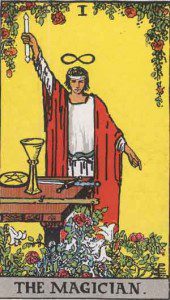 “A poor magician is a poor magician.”
“A poor magician is a poor magician.”
I hear this phrase from time to time. Sometimes it’s proclaimed as a self-evident truth: if your ordinary life is a mess, you obviously aren’t much of a magic worker or you’d do something to get it in order. Other times I hear it slammed as victim-blaming of people who are dealing with economic or other problems not of their own making.
Right or wrong, the phrase remains in use and it’s worth exploring in a little more depth.
First of all, if the stories of our ancestors teach us anything, it’s that we are not defined by our circumstances but by our responses to them. A hero is someone who does great things in difficult situations. Simply looking at someone’s circumstances – or looking at your own – tells you nothing about his or her character and competency.
But circumstances are temporary and constantly changing, and the classic definition of magic is the art and science of creating change in accordance with Will. It is reasonable to expect that if magical people find ourselves in unfavorable circumstances, we will practice our art and science and create changes to make things better – at least within the limits of what magic can and can’t do.
None of us have perfect lives – by anyone’s standards – including those who are highly skilled magicians or devoted priests. To dismiss someone as a “poor magician” because their lives aren’t what we think they should be is arrogant at best.
But over time, circumstances become patterns and patterns become character.
Watch your thoughts; they become words.
Watch your words; they become actions.
Watch your actions; they become habit.
Watch your habits; they become character.
Watch your character; it becomes your destiny.
― Lao Tzu
A magician whose life is in constant chaos needs to look for the cause of the chaos. Does he need to put the grimoire down and pick up a book on home finance? Does he need to cut back on walking between the worlds and start walking in this world – both figuratively and literally? This isn’t just a Pagan thing – my Baptist father used to rant against people who were “so heavenly minded they’re no earthly good.”
I rant against “Pagan Standard Time” not because I’m a slave to the mainstream culture’s infatuation with efficiency but because habitual lateness is a sign of failure to properly plan. If a ritual starts late because the leaders underestimated how long it would take to get ready, what else did they underestimate? What’s the likelihood they made the ritual as good as it could be? What’s the likelihood they spent the necessary time in meditation and prayer with the deities and spirits they intend to invoke and honor?
I’ve yet to do a perfect ritual, and I cut beginners a lot more slack than I cut experienced magicians and ritual leaders. But a consistent pattern of lateness and disorganization tells me I’m dealing with a poor magician.
A magician who has sacrificed material comfort to concentrate on her practice and her craft is a different matter. There are only so many hours in day and so many days in a life, and while it is possible to bring magic and spirituality into a mundane workplace (someone has to make corporate environments less toxic!), if you want to be an artist or an activist you are likely to have to accept a lower material standard of living to find the time your art requires.
This isn’t a question of “working” vs. “not working.” All of us have an obligation to provide for ourselves and our families. It’s a question of deciding what we’re going to work on, what we’re going to work for, and how long we’re going to work on it. Monks agree to live in great simplicity and at times in depravation. It’s a hard life that’s not for everyone, but most of us can recognize the monks’ poor material condition is a sign of spiritual maturity, not weakness.
A magician who has little material wealth and constantly complains about it needs to re-examine his priorities. Does he really need more than he has to be content? Maybe he does – nobody can say how much is enough for someone else. But maybe he needs to accept that he already has enough and his true happiness won’t come from more stuff but from deeper spiritual practice and more devoted service.
It’s worth thinking about the converse, too: maybe a wealthy Druid is a good Druid and maybe he isn’t. We aren’t Puritans – material wealth isn’t a sign of the favor of the Gods, or a sign of skill with magic. Neither is it a sign of selling out. It’s worth remembering that Gerald Gardner was able to be a full-time writer and promoter of Wicca because he was drawing a civil service pension from his years working for the British government in Asia.
So, is a poor magician a poor magician? Maybe – it depends on whether she’s made different trade-offs from what society expects or whether she isn’t paying enough attention to the details of her own life.
Are you following a leader or a teacher who’s a poor magician? Is your role model demonstrating behaviors that are unhelpful and unwise? Or does he simply need less stuff than you do?
Are you a poor magician? If your life is in disorder, start getting it in order one thing at a time. If you need more, start taking steps – both magical and mundane – to obtain what you lack. But if you have what you truly need, perhaps all that is required is to recognize that blessed fact and dive head-first into the calling of your True Will.
















